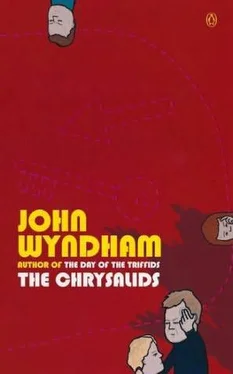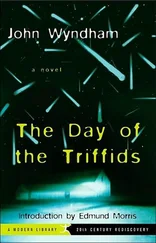For all the good the petitions did, they might never have been sent. Indeed, with no one able to tell, over a stretch of five or six hundred miles, where the next attack would come, it is difficult to see what practical help could have been given. What the Government did do, from its comfortable situation far, far to the east, was to express sympathy in encouraging phrases, and suggest the formation of a local militia: a suggestion which, as all able-bodied males had as a matter of course been members of a kind of unofficial militia since frontier days, was felt to amount to disregard of the situation.
As far as the Waknuk district was concerned the threat from the Fringes was more of a nuisance than a menace. The deepest raid had come no nearer than ten miles, but every now and then there were emergencies, and seemingly more every year, which called the men away, and brought all the farm work to a stop. The interruptions were expensive and wasteful; moreover, they always brought anxiety if the trouble was near our sector: nobody could be sure that they might not come farther one time….
Mostly, however, we led a comfortable, settled, industrious existence. Our household was extensive. There were my father and mother, my two sisters, and my Uncle Axel to make the family, but also there were the kitchen girls and dairymaids, some of whom were married to the farm men, and their children, and, of course, the men themselves, so when we were all gathered for the meal at the end of the day’s work there were over twenty of us; and when we assembled for prayers there were still more because the men from the adjoining cottages came in with their wives and children.
Uncle Axel was not a real relative. He had married one of my mother’s sisters, Elizabeth. He was a sailor then, and she had gone East with him and died in Rigo while he was on the voyage that had left him a cripple. He was a useful all-round man, though slow in getting about because of his leg, so my father let him live with us: he was also my best friend.
My mother came of a family of five girls and two boys. Four of the girls were full sisters; the youngest girl and the two boys were half-sister and half-brothers to the rest. Hannah, the eldest, had been sent away by her husband, and nobody had heard of her since. Emily, my mother, was next in age. Then came Harriet who was married to a man with a big farm at Kentak, almost fifteen miles away. Then Elizabeth, who had married Uncle Axel. Where my half-aunt Lilian and my half-uncle Thomas were I did not know, but my half-uncle, Angus Morton, owned the farm next to us, and a mile or more of our boundaries ran together, which annoyed my father who could scarcely agree with half-uncle Angus about anything. His daughter, Rosalind, was, of course, my cousin.
Although Waknuk itself was the biggest farm in the district, most of them were organized along the same lines, and all of them growing larger, for with the improving stability-rate there was the incentive to extend; every year felling of trees and clearing went on to make new fields. The woods and spurs of forest were being nibbled away until the countryside was beginning to look like the old, long-cultivated land in the east.
It was said that nowadays even people in Rigo knew where Waknuk was without looking it up on the map.
I lived, in fact, on the most prosperous farm in a prospering district. At the age of ten, however, I had little appreciation of that. My impression was of an uncomfortably industrious place where there always seemed to be more jobs than people, unless one was careful, so on this particular evening I contrived to lie low until routine sounds told me that it was near enough to the mealtime for me to show myself safely.
I hung about, watching the horses being unharnessed and turned out. Presently the bell on the gable-end tolled a couple of times. Doors opened, and people came into the yard, making for the kitchen. I went along with them. The warning: WATCH THOU FOR THE MUTANT! faced me as I went in, but it was much too familiar to stir a thought. What interested me exclusively at the moment was the smell of food.
Iusually went over to see Sophie once or twice a week after that. What schooling we had — which was a matter of half a dozen children being taught to read and write and do some sums by one or another of several old women — took place in the mornings. It was not difficult at the midday meal to slip away from the table early and disappear until everyone would think someone else had found a job for me.
When her ankle was quite recovered she was able to show me the favourite corners of her territory.
One day I took her over our side of the big bank to see the steam-engine. There wasn’t another steam-engine within a hundred miles, and we were very proud of it. Corky, who looked after it, was not about, but the doors at the end of its shed were open, letting out the sound of a rhythmic groaning, creaking, and puffing. We ventured on to the threshold and peered into the gloom inside. It was fascinating to watch the big timbers moving up and down with wheezing noises while up in the shadows of the roof a huge cross-beam rocked slowly backwards and forwards, with a pause at the end of each tilt as though it were summoning up energy for the next effort. Fascinating — but, after a time, monotonous.
Ten minutes of it were enough, and we withdrew to climb to the top of the wood-pile beside the shed. We sat there with the whole heap quivering beneath us as the engine chugged ponderously on.
‘My Uncle Axel says the Old People must have had much better engines than this,’ I told her.
‘My father says that if one-quarter of the things they say about the Old People are true, they must have been magicians: not real people, at all,’ Sophie countered.
‘But they were wonderful,’ I insisted.
‘Too wonderful to be true, he says,’ she told me.
‘Doesn’t he think they were able to fly, like people say?’ I asked.
‘No. That’s silly. If they could’ve, we’d be able to.’
‘But there are lots of things they could do that we are learning to do again,’ I protested.
‘Not flying.’ She shook her head. ‘Things can either fly, or they can’t, and we can’t,’ she said.
I thought of telling her about my dream of the city and the things flying over it, but after all, a dream isn’t much evidence of anything, so I let it pass. Presently we climbed down, leaving the engine to its panting and creaking, and made our way over to her home.
John Wender, her father, was back from one of his trips. A sound of hammering came from the outside shed where he was stretching skins on frames, and the whole place smelt of his operations. Sophie rushed to him and flung her arms round his neck. He straightened up, holding her against him with one arm.
‘Hullo, Chicky,’ he said.
He greeted me more gravely. We had an unspoken understanding that we were on a man to man basis. It had always been like that. When he first saw me he had looked at me in a way that had scared me and made me afraid to speak in his presence. Gradually, however, that had changed. We became friends. He showed me and told me a lot of interesting things — all the same I would look up sometimes to find him watching me uneasily.
And no wonder. Only some years later could I appreciate how badly troubled he must have been when he came home to find Sophie had sprained her ankle, and that it had been David Strorm, the son of Joseph Strorm, of all people, who had seen her foot. He must, I think, have been greatly tempted by the thought that a dead boy could break no promise…. Perhaps Mrs. Wender saved me….
But I think he could have been reassured had he known of an incident at my home about a month after I met Sophie.
Читать дальше












